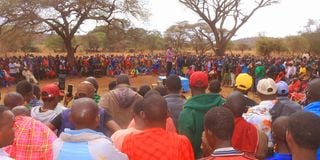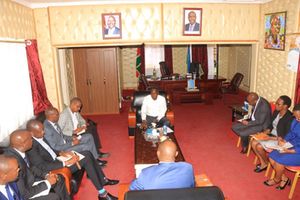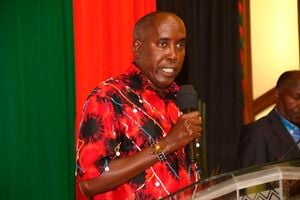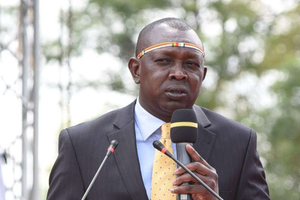
Kajiado Governor Joseph Ole Lenku (centre) addresses a community meeting in Orgira village over Rombo Group Ranch, where the subdivision of the vast land has locked out many vulnerable community members.
An initiative by the Lands ministry and Kajiado County Government to empower a Maasai community through individual land ownership is at risk of disinheriting thousands after the process was hijacked by cartels and fraudsters.
The decision to change the ownership of Rombo Ranch from communal to individual was partly informed by suspected illegal dealings on the vast land, measuring 94,500 acres, by successive leadership regimes that benefitted at the expense of their members.
The expansive Rombo Ranch was among several community ranches that were earmarked for subdivision to avert land ownership wrangles, illegal leasing out of land reserved for wildlife conservation, and irregular sale of parcels of land by the management to non-members.
Over the years, the pastoral community also lived communally within the ranch under the leadership of the ranch management— denying individual members the chance to put up permanent development structures and other benefits guaranteed by a freehold title deed.

Mr Alex Kilowua (left) and other leaders during a tour of Rombo Ranch.
In the plan that kicked off in 2020, each of the 12,000 families, including widows and orphans, was to be allocated a parcel that would see them get a share of both the wetland and rangeland.
But the drive has turned into a circus after widows, orphans and vulnerable residents found themselves disinherited from the land they have called home for many years by some of their leaders working in cahoots with cartels in Kajiado and Nairobi.
“Some political operatives have ganged up with rogue officials to dispose of the land they have acquired fraudulently. We shall not rest until justice is done for all,” Kajiado Governor Joseph Ole Lenku said last week at Orgira when he convened a joint community meeting on the matter with the County Security Committee chaired by County Commissioner James Taari.
The meeting was called after tension ran high in Rombo, with the county chiefs seeking to calm down affected families as they pursue justice in court.
The Nation has dug up insider details of why there is an implosion at Rombo, a food basket in Kajiado South near the border with Taita Taveta County and Northern Tanzania.
Besides supporting farming, the ranch has a long stretch of a wildlife corridor near the Tsavo National Park, further bringing in tourism cash from conservancies and other touristic excursions.
The subdivision and issuance of title deeds has run into headwinds, halfway through the process, after it was discovered that ranch officials closed up the list of beneficiaries at 6,000, members against 12,000 members— majority of those locked out being children of original members above 18 years.
The Rombo-land deals, documents show, is a plot to disinherit the poor who are unable to keep up with the pace of corruption by individuals locals term as “powerful and influential”.
In the scheme, officials conspired and allocated themselves, their cronies, their relatives, local chiefs, pastors, and politicians prime pieces of land on wetlands.
Before the sub-division started, the community agreed to have those in wetlands (good for agriculture) allocated nine acres while those on the drier rangelands were to be allocated 12 acres.
This was the first point of conflict since it was unclear how the group officials arrived at those to be allocated the wetlands, with some families having had to be moved from the places they had called home since birth.
Each family was to contribute Sh23,000 as survey fees but even after parting with the cash, thousands of members are yet to receive their titles.
While chairman of the Group Ranch John Sitelu told the Nation that some 5,800 members had already received their titles, insider sources said 1,800 members were yet to be granted ownership, raising questions on where the more than Sh40 million is.

Mr Alex Kilowua (left) and other leaders during a tour of Rombo Ranch.
“We have two registers. Our register has 6,000 register contrary to the other one fronted by a section of the members. I can divulge much information but you can liaise with relevant land offices to ascertain the number of registered members," Mr Sitelu told the Nation on Saturday, August 17.
Mr Sitelu and the entire ranch leadership gave the security meeting called Mr Lenku a wide berth.
Survey maps drawn by a taskforce appointed by the county government to investigate land allocation in Rombo indicate that some ranch leaders have been allocated more than one piece of land.
“People have been forced to relocate from their homes. The powerful officials did not complete the registration of all members. They illegally capped the members at 6,000. Many people are stranded,” says Lemalon Oseur, a youth leader who pointed out that households without fathers were left out.
Documents and survey maps also show some individuals were allocated many pieces of land; some 61 while others got 39 and 27.
In the same maps, some plots remain unallocated amid allegations that some top officials are holding the pieces on behalf of non-members who bought them secretly.
The community, Mr Oseur lamented, is also up in arms over 6,000 acres illegally allocated to individuals, yet it was set aside for conservancies to enable the community tap into the millions of shillings that accrue from tourism in the area.
“The community agreed to have 25,000 acres for wildlife conservation, out of which 1,000 acres was a wildlife corridor. Now, there are 19,000 acres for that purpose. Where are the 6,000 acres? We fear an increase in human-wildlife conflicts due to the greed of a few,” he said.
At the security meeting on Monday, Mr Taari announced that all land transactions in Rombo ranch had been suspended.
“There is a court order on status quo. Any deal on land in this area is illegal. There should be no more subdivision and issuance of title deeds and transfers until the case is concluded,” he said.
Incidentally, and in a rare occurrence, at least four chiefs boycotted the county commissioner’s meeting after being put on notice by the public that they were part of those who had been allocated several parcels.
A former assistant county commissioner is among individuals who have been allocated six pieces of land measuring 22 acres.
“Blatant violation of the people’s land rights cannot be allowed. Both the county and national governments are here to protect all residents. The local community knows each other and when they claim they have been disinherited, it is easy to confirm the truth,” said Mr Lenku
The governor who first issued the first batch of title deeds at Matepes in 2021, said the investors who had done due process had nothing to worry about.
“What we are going to fight with all our might is a few individuals acquiring Rombo land at the expense of real members,” said Lenku.
The intervention by Mr Lenku and Mr Taari was informed by the continued disposal of the disputed land to unsuspecting investors despite a court order issued by Justice Maxwell Gicheru on May 5, 2023.
In the case on the Rombo land (LR-Loitokitok/Rombo “B”/ 406), Mr Kapaito Ole Paika and 27 others had sued Mr Sitelu and 17 others with the National Land Commission listed as an interested party.
In the prayers, the Kapaito group sought to restrain the officials from further surveying, demarcating and subdividing the land. They also asked the court to stop further transfers and issuance of title deeds.
Justice Gicheru of the Environment and Land Court, agreed with the Kapaito team, especially after proving that non-members had been allocated the Rombo land illegally.
The judge noted that the “rush to sell” the land indicated an effort to conceal suspected fraudulent activities.
“If non-members are allowed to own land that doesn’t belong to them and dispose of it, members will stand to lose. If the officials have done a good job, they should cooperate in the audit that this suit intends to carry out. They have nothing to fear,” the judge said in his ruling.
After the Lenku-Taari meeting, some residents started to stream back to their original homes where they had been ordered to vacate.
Until the land audit is done and completed, it seems the Rombo land saga will continue to boil over especially because some of those already issued with title deeds have sold out part of their lands to investors.








